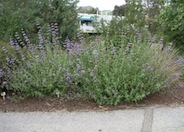
Common name:Purple Sage
Botanical name:Salvia leucophylla
The purple sage is an evergreen shrub that grows 2-3' tall by 5-6' wide. It has white tomentose stems and leaves and light purple flowers that bloom between May and June. This shrub tolerates heat and drought. The purple sage is a California native. -Cornflower Farms

Common name:Catmint
Botanical name:Nepeta X faassenii
Nepeta faassenii makes soft, gray-green, undulating mounds o 1.5 ft. high in bloom. The small leaves are attractive to cats. This perennial has lavender blue flowers in late spring, and early summer.
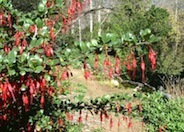
Common name:Fuchsia-Flowering Gooseberry
Botanical name:Ribes speciosum
This semi-evergreen shrub is 4-6' high with drooping, shiny red fuchsia-like flowers that bloom in early spring and spiny stems. It makes a good barrier plant.
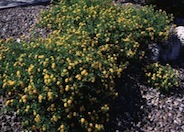
Common name:New Gold Trailing Lantana
Botanical name:Lantana 'New Gold'
Another reliable bloomer on and off thru the year. Provides wonderful golden flowers, and benefits from deep, infrequent watering and some pruning. Butterfly attractor. Forms dark green mound 18" by 3'. May suffer some frost damage but will recover quickly. Very root hardy. Susceptible to whiteflies.
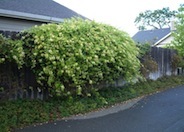
Common name:Hall's Japanese Honeysuckle
Botanical name:Lonicera japonica 'Halliana'
The 'Halliana' is a vigorous, hardy, climbing vine with deep green, oval leaves and fragrant white flowers that change their color to yellow. It is good for ground cover or covering fences.
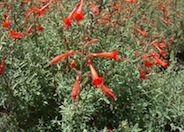
Common name:California Fuchsia, Zauschneria
Botanical name:Epilobium canum canum
The California fuchsia is a perennial with dense, narrow, green-grey foliage and red-orange summer flowers. The growth habit of this plant is sprawling and low. The California fuchsia is native to California, is drought tolerant, and attracts hummingbirds. -Cornflower Farms
Note: More commonly known in the nursery trade as Zauschneria cana or Z. canum.
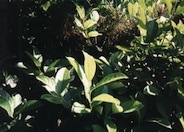
Common name:Japanese Viburnum
Botanical name:Viburnum japonicum
10 x 15' tall, 8-12 ' wide. A good hedge, screen or small tree. 6 in. leathery, shiny leaves.
We can identify at least 11 steps of sustainable landscape renovation for consideration. They include critical design, installation and maintenance practices that conform to good principles of appropriate horticulture.
Click in the green box for more information
Designer: Kat Weiss Landscape Design
Photographer: GardenSoft
Incorporate compost 6" into your soil to retain water, reduce compaction, feed earthworms, and provide valuable nutrients to your plants.
Mulching and adding compost to soil can minimize evaporation and help soil absorb and store water.
Remove irrigation water and fertilizer from areas where you don't want weeds to grow.